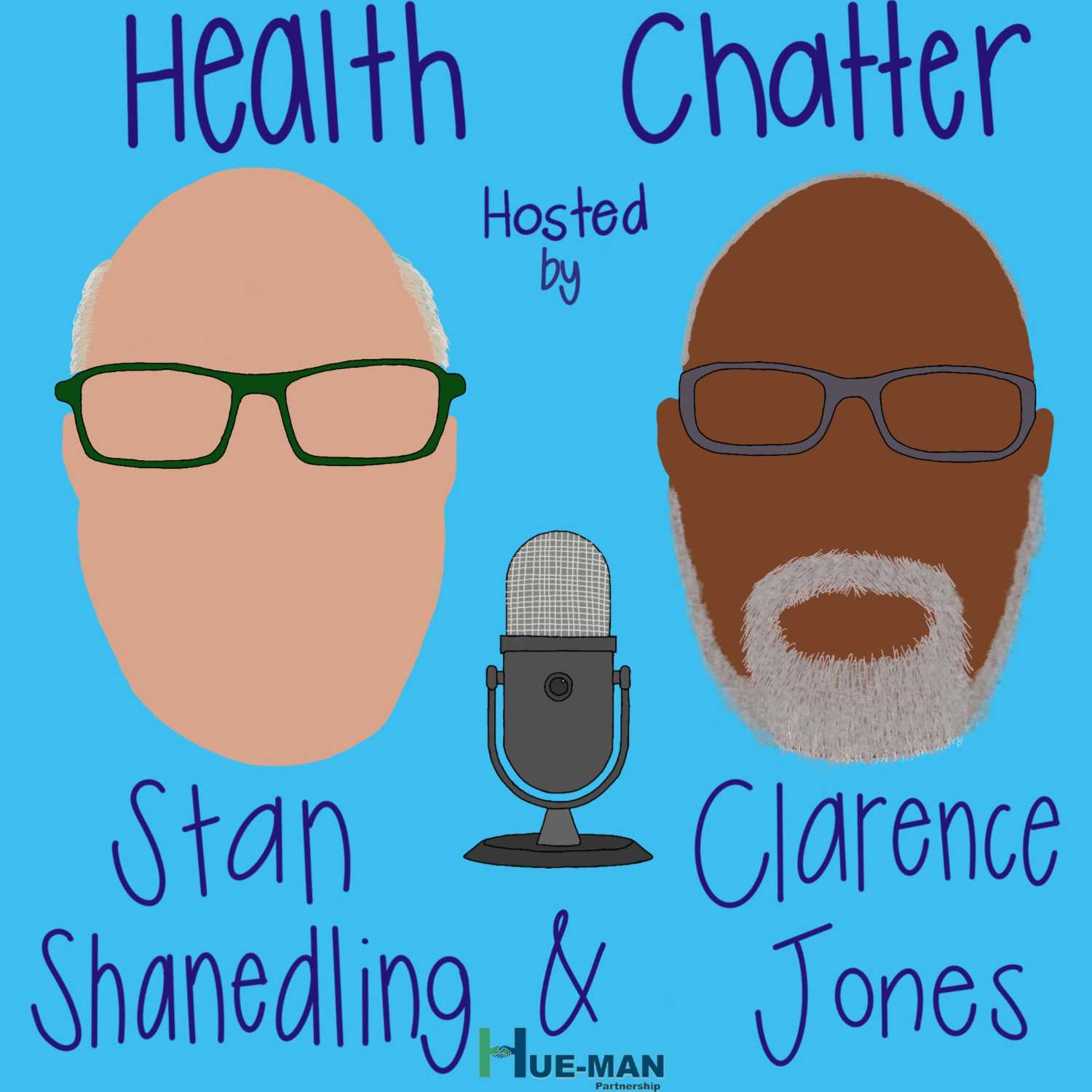Nov. 11, 2022
Alzheimer's and Memory Loss
The player is loading ...

Stan and Clarence chat with Dr. Manka Nkimbeng about Alzheimer's and memory loss.
Check out our new website at healthchatterpodcast.com
Brought to you in support by Hue-MAN who is Creating Healthy Communities through Innovative Partnerships. More about their work can found at http://huemanpartnership.org/
Dr. Manka Nkimbeng
- Assistant Professor - Division of Health Policy and Management (University of Minnesota School of Public Health)
- Affiliate Professor in School of Nursing
- Education
- PhD (philosophy) - Johns Hopkins University School of Nursing
- MPH - Boston University
- BSN - University of Massachusetts
- Research interests include understanding the causes of health inequities in minorities and improving health outcomes for older adults
- 60+ publications
- Guest on Voices of Aging Podcast (November 2022)
- Aging Studies Interdisciplinary Group/University of Minnesota Center for Healthy Aging and Innovation
- Discussed her background as a nurse, what inspired her to pursue a career in aging, and her current research which focuses on immigrant experiences of aging
Research
- What is Alzheimer’s?
- Most common type of dementia and involves parts of the brain that control thought, memory, and language
- Progressive disease that starts with mild memory loss and potentially leads to loss of ability to carry on a conversation and/or respond to environment
- Less common in younger people
- Scientists do not fully understand what causes Alzheimer’s and there is currently no cure
- Risk factors include age, family history, and potentially education/diet/environment
- 10 symptoms of Alzheimer’s
- Memory loss that disrupts daily life
- Challenges in planning or solving problems
- Difficulty completing familiar tasks
- Confusion with time/place
- Trouble understanding visual images and spatial relationships
- New problems with words (speaking or writing)
- Misplacing things & losing the ability to retrace steps
- Decreased/poor judgment
- Withdrawal from work and/or social activities
- Changes in mood or personality
- Fast Facts
- 5.8 million Americans were living with Alzheimer’s in 2020
- The number of people with Alzheimer’s doubles every year after age 65
- Alzheimer’s is the 5th leading cause of death among adults 65+ in the United States
- What is Dementia?
- Not a specific disease → general term for memory loss and impaired ability to think or make decisions around everyday life
- Dementia is not a normal part of aging
- Symptoms include problems with memory, attention, communication, reasoning & judgment, etc.
- Risk factors include age, family history, race/ethnicity, poor heart health, and traumatic brain injury
- Most common types of dementia are: Alzheimer’s, vascular dementia, lewy body dementia, fronto-temporal dementia, and mixed dementia
- Treatment depends on the underlying cause
- Neurodegenerative dementia like Alzheimer’s has no cure
- Medication can help and leading a healthy lifestyle can decrease the chances of developing a chronic disease
- People with dementia are often denied basic rights and freedoms
- In many countries, physical and chemical restraints are used extensively in care homes for older people
- Fast Facts
- 14 million adults (65+) are projected to have dementia in the United States by 2060
- More than 55 million people currently live with dementia worldwide
- Over 60% of these people live in low/middle-income countries
- 10 million new cases every year
- 65% of dementia-related deaths are women (worldwide)
- Latino folks are 1.5x more likely to have dementia than white folks
- Alzheimer’s accounts for 60-80% of dementia cases
- 50% of the global cost of dementia is attributed to informal care
- The estimated total global cost of dementia was $1.3 trillion
- Costs are expected to surpass $2.8 trillion by 2030 (both the number of people living with dementia and care costs will continue to increase)
- What is “Normal” Memory Loss?
- Normal age-related memory loss doesn't cause a significant disruption in your daily life
- Memory loss that disrupts your life is one of the first or more-recognizable signs of dementia
- Examples: asking the same questions repeatedly, forgetting common words when speaking, getting lost while driving/walking, etc.
- Tips for dealing with forgetfulness
- Learn a new skill
- Follow a daily routine
- Plan tasks/make lists/use memory tools
- Put things like wallet, phone, keys, etc. in the same place every day
- Exercise and sleep well
- Prevent/control high blood pressure
- Additional Thoughts and Questions for Dr. Nkimbeng
- Can you speak more to the disparities that exist in memory loss diseases and conditions?
Sources
- https://www.cdc.gov/aging/aginginfo/alzheimers.htm
- https://www.cdc.gov/aging/dementia/index.html#:~:text=Dementia%20is%20not%20a%20specific,a%20part%20of%20normal%20aging.
- https://www.alz.org/alzheimers-dementia/what-is-dementia
- https://www.who.int/news-room/fact-sheets/detail/dementia
- https://www.mayoclinic.org/diseases-conditions/alzheimers-disease/in-depth/memory-loss/art-20046326
- https://www.nia.nih.gov/health/memory-forgetfulness-and-aging-whats-normal-and-whats-not



